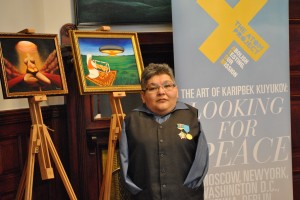 Honorary ATOM Project Ambassador, painter and anti-nuclear weapons activist Karipbek Kuyukov called on humanity to abandon nuclear weapons during the international Euro Mediterranean Forum against nuclear weapons in Ankara on June 21-22.
Honorary ATOM Project Ambassador, painter and anti-nuclear weapons activist Karipbek Kuyukov called on humanity to abandon nuclear weapons during the international Euro Mediterranean Forum against nuclear weapons in Ankara on June 21-22.
“I am happy to live at a time when the voice of one person can be heard and supported by millions living in the most distant places of the Earth,” Kuyukov, who was born without arms and paints with his feet and mouth, told several dozen experts and activists. “Our voices can become one powerful voice! We have a choice: to be passive and let the heads of states solve the issue or unite and defend our citizenship and human rights.”
Kuyukov, who was born 100 kilometres from the ill-famed Semipalatinsk nuclear test site in Kazakhstan, has been an anti-nuclear weapons activist for more than two decades and has travelled the world campaigning against the consequences of nuclear weapons.
“I was born in Yegyndybulak Village, which is not far from the nuclear test site. When I was a child, my parents used to tell me stories about how the ground trembled and they were told by the military police to keep the windows open and leave their houses and take cover outside. At that time, we didn’t know the truth that we were exposed to something horrible, something that left scars until these days,” Kuyukov said.
Several dozen of Kuyukov’s works have been presented in many countries under the auspices of The ATOM Project (www.theatomproject.org), an international online petition to help bring into force the Comprehensive Nuclear Test Ban Treaty (CTBTO).
“Through my works, I wanted to show the horrible consequences the atomic explosions left on our land for generations, the tears of mothers for their children and the endless pain of families that have lost their hope of restoring the health of their families,” Kuyukov stressed.
“Together with The ATOM Project, we have travelled to the U.S., Europe, presented our works in the UN headquarters in Vienna. We continue to urge people around the world to support our cause and to sign the petition. We need this today to avoid such errors in our future and to make sure our children have a bright and nuclear-weapons-free future,” Kuyukov emphasised.
“Our exhibition is in Washington, D.C. right now, and we are working on bringing it now to Astana, the capital of Kazakhstan, to acquaint the local populace with my works during the celebration of the International Day against Nuclear Tests on August 29,” Kuyukov explained.
“It is an important day in history. As per the proposal of our President Nursultan Nazarbayev, the United Nations General Assembly declared August 29 the International Day against Nuclear Tests.”
The UN resolution adopting this day as a day against nuclear tests calls for increasing awareness and education about the effects of nuclear weapon tests and the need for their cessation as a means to achieve a nuclear-weapons-free world. The resolution was initiated by the Republic of Kazakhstan to commemorate the closure of the Semipalatinsk Nuclear Test site on Aug. 29, 1991.
“Every single person has a right to decide the future they want for themselves, their families and their nation. Our common goal is to protect mankind from the nuclear nightmare. Let our sky be clean and our children be healthy,” Kuyukov told forum participants.
During the forum, other speakers supported ideas of a nuclear-weapons free world. Cluster Munition Coalition Spokesperson Branislav Kapetanović from Serbia stressed that, “It is important that in the future, all of us are engaged to a maximum in raising awareness of the dangers and consequences of nuclear weapons. Since we succeeded in a very difficult voyage, such as banning cluster munitions, there shouldn’t be any reason not to succeed in actions to ban nuclear weapons whose consequences are unimaginably bigger and more monstrous than we have ever experienced as mankind.”
An expert from Egypt, Ahmed Sa’da, mentioned the health impact of nuclear weapons. “If the U.S. uses the nuclear bombs that it has, two billion people would die immediately. And if a bomb the size of the one dropped on Hiroshima is dropped on Ankara, which is the capital of Turkey, 1.5 million people would die immediately. We create our own diseases. Nuclear weapons are one of them. They are a product of human beings and they are very dangerous. They should be banned immediately,” he said.
In total, 40 other activists, experts, victims of nuclear tests and land mine victims from 30 countries, including from the Middle East, North Africa and South East Europe regions, participated in the conference. Among them were Susi Snyder from Pax/ICAN, Martha Barcena Coqui, ambassador of Mexico, and Sabine Kroissenbrunner, deputy head of the Austrian Mission. Other participants came from Albania, Macedonia, Romania, Serbia, Kosovo, Croatia, Bosnia, Greece, Belarus, Algeria, Georgia, Bahrain, Lebanon, Tunisia, Morocco, France and Sweden.

